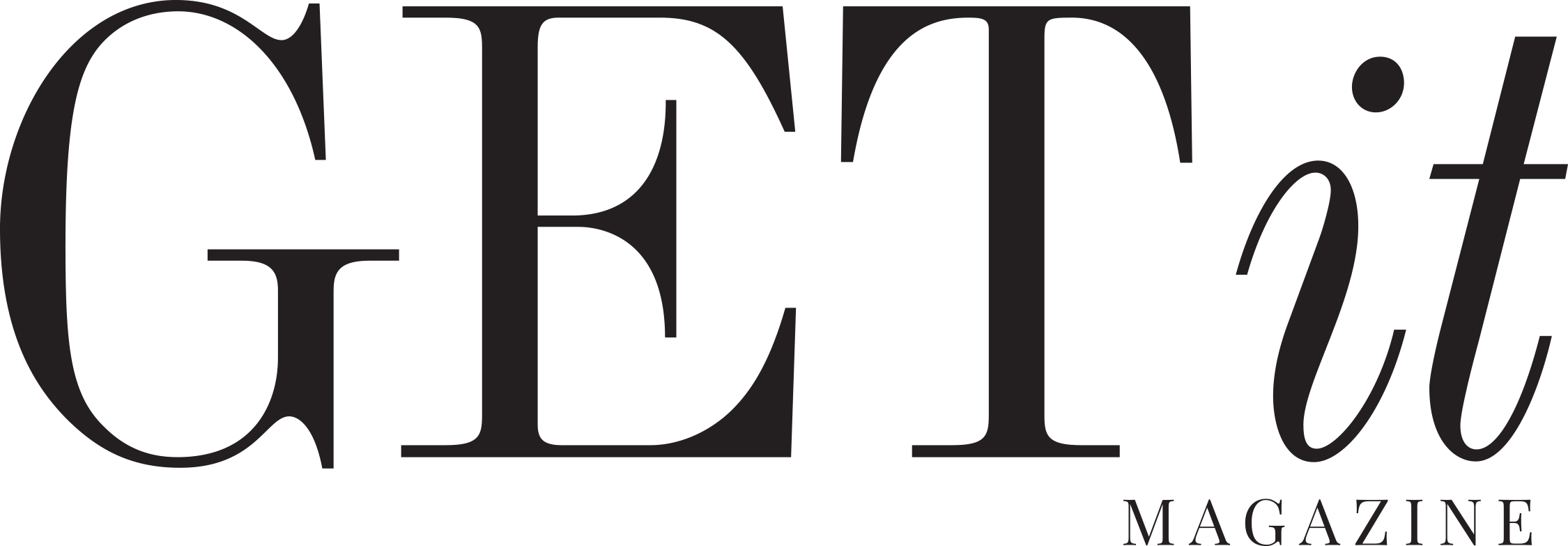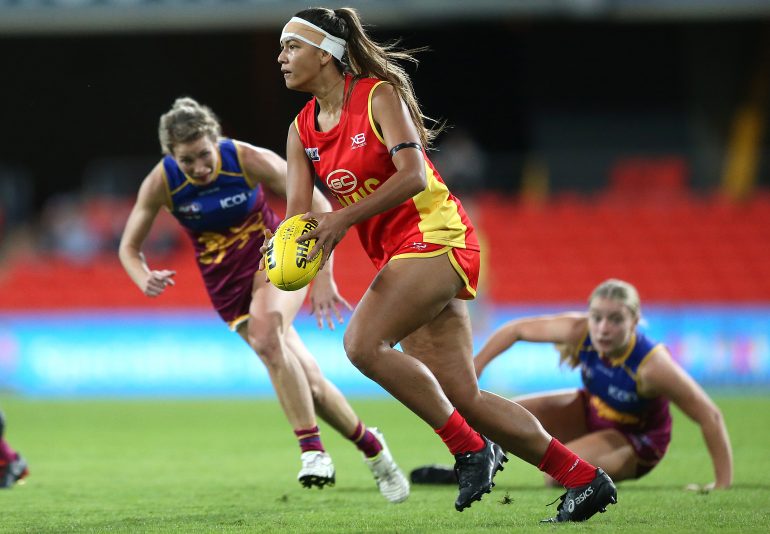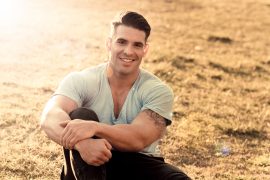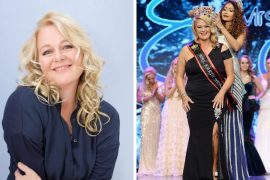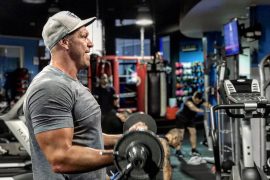Get it’s Kathleen Loxton meets with the Gold Coast SUNS’ General Manager of Consumer and Community, Jane McGough
Kathleen: In particular, this period going into 2020 has been such an important time for the team, with lots of hard work. What’s been the highlight for you personally?
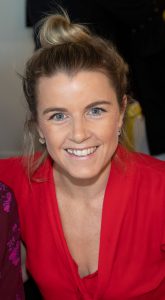
Jane: We’ve been working on our entry into the 2020 AFLW Season for almost two and a half years now. The first step was back in early 2017 when we applied to receive one of the licenses that the AFL was going to grant for the 2020 season. We put in a great bid, and in September 2017 we were advised that along with the West Coast Eagles, St Kilda and Richmond, we would all be entering the competition in the 2020 season. From there we worked on how best we as a club could prepare ourselves over the two-year lead in. We saw this as a really great opportunity to start to integrate a women’s football program into our club, and worked with the AFL and AFL Queensland to establish the Winter Series in 2018, that saw us play games against the GWS Giants and Brisbane Lions. The three-game round robin competition enabled us to effectively practice for AFLW across all areas of the business; integrate women’s football as part of our club, attract sponsors and develop memberships, all whilst starting to identify players that would form our inaugural AFLW team.
For me personally seeing the girls run out as SUNS players for that first game in June 2018 was amazing. However, trumping this was what occurred a month later, after being back page of the Gold Coast Bulletin that morning, was when the girls ran out onto Metricon Stadium, through the banner with the SUNS theme song blasting throughout the stadium, to take on the Lions. Just witnessing the looks of disbelief, excitement and nervous anticipation was really quite emotional.
K: This is momentous for the industry! Speaking of which, what are the goals set for the team next year?
J: As mentioned, the preparation process has been going for a couple of years now. Over the past 12 months in particular we’ve been securing sponsors, recruiting coaches and staff, signing on players and preparing our Club for entry in AFLW.
As a club for 2020 we’re aiming to achieve three goals: one, provide the best possible football program we can for our players and staff, including support both on and off the field; two, to be able to demonstrate a pathway and inspire young female athletes to reach the elite level; three, be known as the best integrated football club in the country, across all of our men’s, women’s, administration and academy teams.
K: I understand you have seen the impact of representation already with young fans, particularly girls being encouraged by seeing women playing this fantastic sport. What does this mean for you and the women on the team?
J: One of the best things about AFLW is that young girls growing up today won’t know any different and how things ‘used to be’. They’ll see men and women playing footy on TV, they’ll see women across all level of the industry — administration, media, coaching, playing, umpiring, boards — and it will be the norm.
The impact that AFLW has had across the industry and women in general is significant. What we’ve seen since the first women’s AFL exhibition game between Melbourne and the Western Bulldogs in 2013 is pretty astounding. We’ve seen female participation across the country skyrocket, blowing the growth in men’s participation out of the water. Queensland has had the biggest year on year increase in female participation, up 19 per cent in the past 12 months and in the past three years, there has been 133 new community women’s football teams – an increase of 113 per cent.
There are now pathways for women and girls in all aspects of the sport and girls can aspire to be whatever they want to be! We’ve also seen women empowered, heroes created before our very eyes, and we’ve seen players become role models, trailblazers, influencers and spokespeople for social change. Little girls and boys come to games with their favourite players on their backs, those of our women’s players, and you’ll see them queuing for selfies and autographs. It’s very special to see.
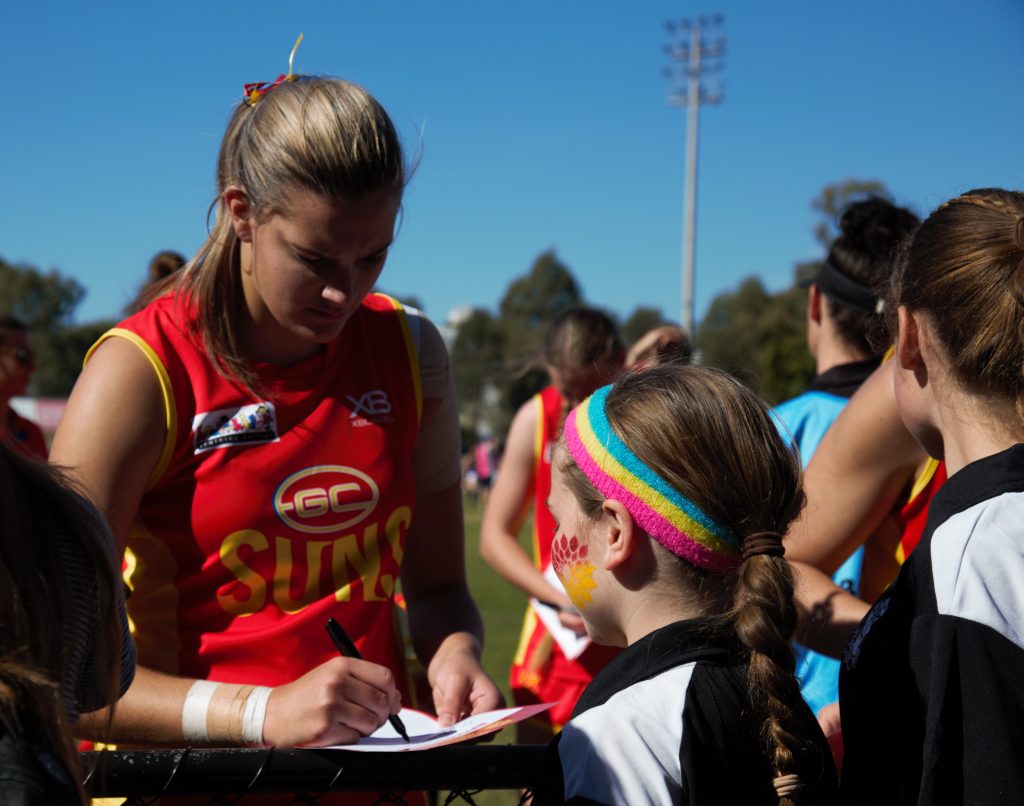
K: Your history concerning sport is so interesting. Can you share with our readers where it all started?
J: I grew up in Hobart, where I lived for the first 18 years of my life. I loved school, loved being involved in sport, playing everything from hockey, netball, athletics and softball, but found rowing in year seven and focussed on that for the rest of my school life. I was pretty successful from a state and school competition perspective, but given my height (or lack of it), didn’t look to pursue it any further than that. One sport that was never an option for me at an all-girls school over 20 years ago was footy…
Whilst I was relatively good at sport, and loved playing it, I never looked at it from a career perspective, either as an athlete or working in it. As I look back now though, I was in fact starting to set up my path and subconsciously preparing myself for a life within the sports industry.
A family friend of ours ran kids’ sports clinics in the school holidays, and from about the age of 15 I started working for him. It didn’t take me long until I was effectively running clinics every school holiday, which included managing all of the registrations, programming, lunches for the kids and managing the talent once he had locked them in. You’d even find me, as a 17-year-old P-plater in my 1986 Mitsubishi Colt, picking up some of the AFL’s biggest names, and taking them to appear and coach at the clinics. I could say that right there, my career in the sports industry began.
For all of my high school life I had decided I was moving to Melbourne. I was going to go to the University of Melbourne and study physiotherapy, which I applied for, got in, and at the last minute changed courses to commerce and sports management — still in Melbourne of course. So, two weeks after I turned 18, I hopped in my car drove to the northern tip of Tassie, hopped on a boat and moved to Melbourne — the sporting capital of the world!
I’d always loved watching footy, and cricket to be honest. With my younger brother lacking the sports gene, Dad and I watched a heap of footy and cricket together all through my childhood. Living in Hobart in the 80s and 90s, I didn’t really ever get to see that much live sport, particularly live footy. So, the thought of actually working within the sport that I loved never really felt within reach and to be honest not something I’d considered as a young girl. Moving to Melbourne saw my passion for sport, live sport and the experience it provides, grow and the longer I worked within the AFL industry, the clearer my path became.
So fast forward through almost ten years at Melbourne’s biggest sport and leisure facility working on the Commonwealth Games, World Swimming Championships, millions of centre visitors per year, and through networks I’d made over this time, I ended up at Melbourne Football Club, a place I called home for seven years. Just over two and a half years ago, I made my way to the Gold Coast to lead the SUNS Consumer and Community team and form part of the Executive Team at the Club. I am loving my time here and see my future on the Coast and at the Club. The opportunities for women and girls in our community are now endless. The simple job (and big responsibility) we have as a club is to inspire the Gold Coast community and make more people fall in love with our game, hopefully as much as I do.
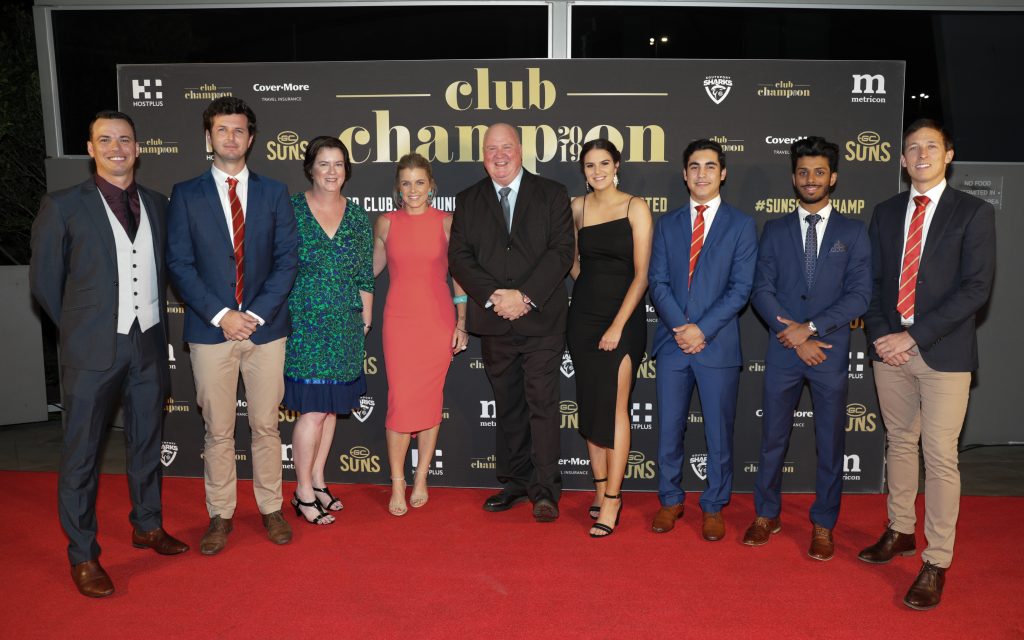
K: Female footballers are banding together from the Gold Coast, Northern Rivers and throughout North Queensland, do you feel this comradery is part of this sporting tradition?
J: It is indeed. Our team members come from all parts of Queensland and a couple from the Northern Territory as well, and this coming preseason, their first as an AFLW team, will be where they really start to build together as a team. There’s a mix of experience from other AFLW teams, other sports and a few straight out of school but together we see them growing as a group and a team for many years to come. They’ll be the only women’s professional sports team on the Gold Coast competing in a national competition and we should all be really proud of them!
K: Finally, what do you feel are the defining characteristics of a great sportsperson?
J: One thing I have never been is a great sportsperson, but looking at the women we’ve got as part of this team, they bring so much more than their sporting ability. We have teachers, doctors, mothers, an environmental scientist, players in their 30s, young players that have come through our talent academy, players from different sports, and girls that played the game as kids, only to have been forced to give up due to a lack of opportunities, and have come back again. Each of them brings their own story and experiences, but what you’ll find is they are all dedicated, passionate, fierce, extremely competitive, resilient and most importantly, they are a family. They’ll work for one another, they’ll play for one another and they’ll each become a very important part of this special club, the Gold Coast SUNS.
